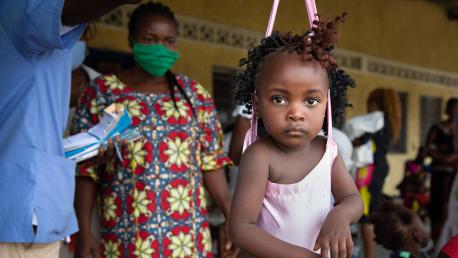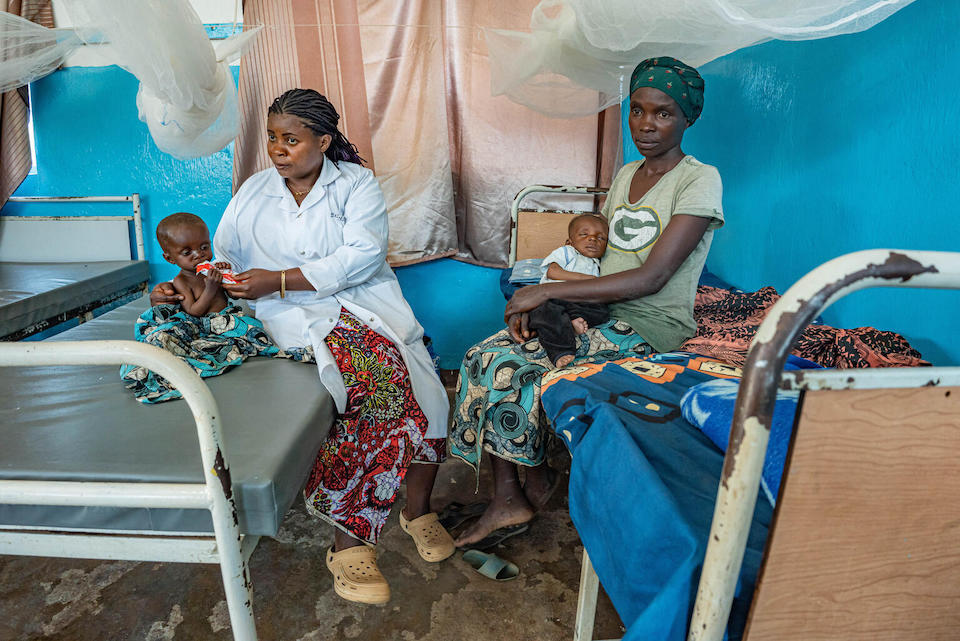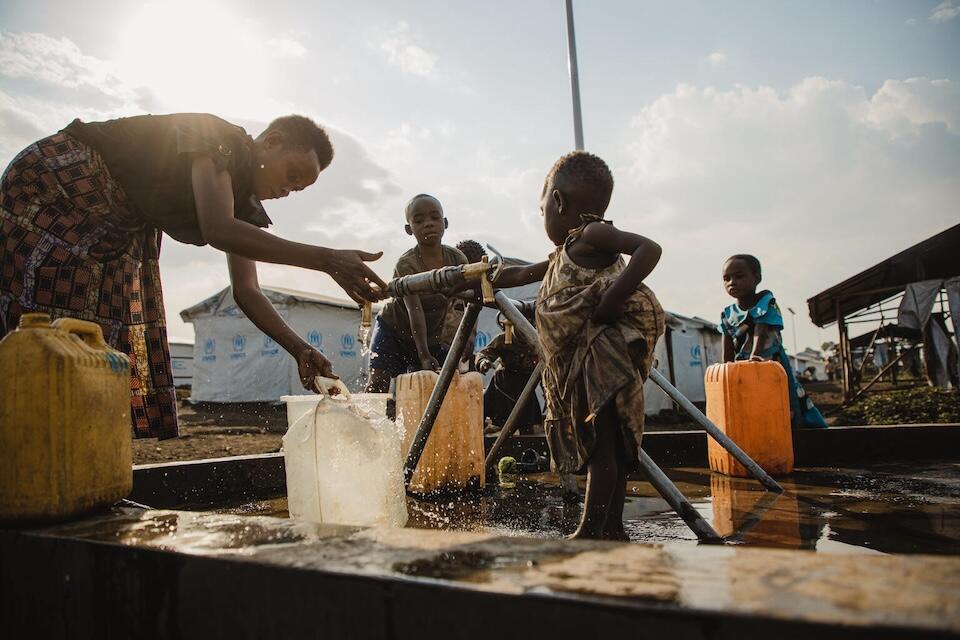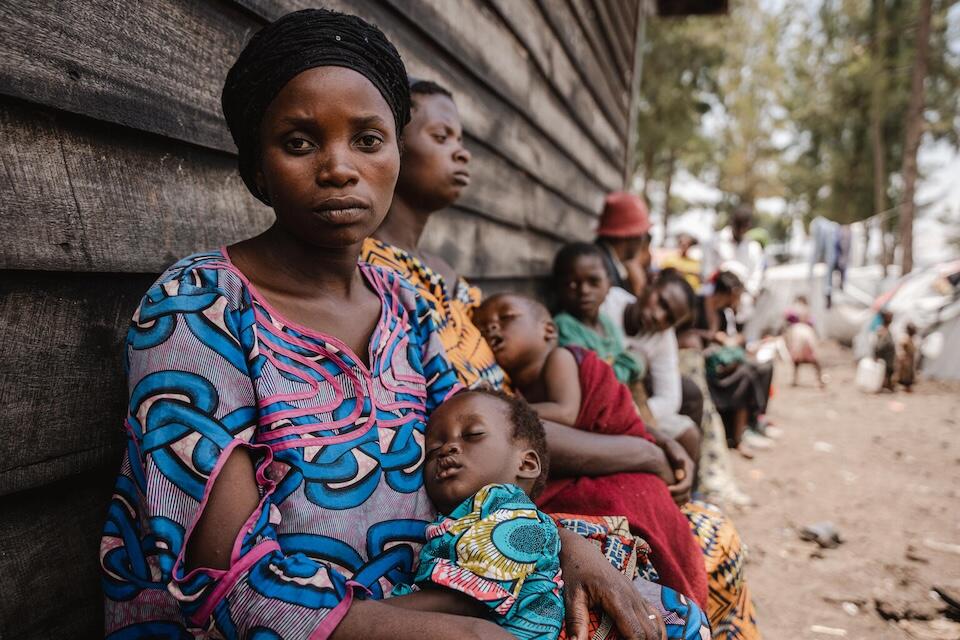
UNICEF in the Democratic Republic of the Congo
Violent conflict, insecurity, flooding, displacement — these and other escalating crises have intensified humanitarian needs in the DRC. Rapid response teams and other UNICEF staff are reaching children and families with lifesaving assistance, but more support is needed to scale the response.
Grave risks for children in the Democratic Republic of the Congo
The DRC is facing one of the world’s most complex crises.
Surging armed conflict and inter-communal clashes have led to unprecedented levels of displacement, with nearly 15 million children bearing the brunt.
The ongoing violence has extended beyond eastern DRC and into the west of the country, with inter-communal conflicts in Mai-Ndombe province, less than 100 miles from the capital Kinshasa. More than 7 million people in the country are displaced, particularly due to the operations of armed groups such as the M23 and the Allied Defense Forces (ADF) across the eastern provinces of North Kivu, South Kivu and Ituri. An estimated 400,000 people were displaced in North Kivu during the first 10 weeks of 2024 alone.
Displaced children live in precarious conditions, with limited access to essential services such as safe water and health care. They can easily become separated from families and caregivers, and face higher risks of violence, exploitation and abuse. Cases of sexual and gender-based violence in particular are on the rise, especially in North Kivu.
“Violence against children in the eastern Democratic Republic of the Congo has reached unprecedented levels,” Grant Leaity, UNICEF’s Representative in the DRC, said during a Sept. 8, 2023 press briefing. "On a daily basis, children are being raped and killed. They are being abducted, recruited and used by armed groups — and we know the reports we have are only the tip of the iceberg.”
A flooding-induced cholera outbreak poses yet another threat, making need for improved access to clean water and sanitation, especially at displacement camps, increasingly urgent. Other preventable diseases like measles are also on the rise, adding pressure on an already overstretched health system.
Child malnutrition remains critical, with more than 1.2 million children under age 5 in need of treatment for severe acute malnutrition, or wasting disease, which is life-threatening.
UNICEF has the solutions to respond to all the humanitarian needs of children, provided we have the resources to do so. — Grant Leaity, UNICEF Representative, Democratic Republic of the Congo
The impacts of climate change are increasingly brutal as well, with more frequent flooding and deadly landslides causing further displacements and hobbling essential services due to damage to water and sanitation infrastructure, schools and health care facilities. In May 2023, in the vicinity of Kalehe in South Kivu province, a major landslide led to the death or disappearance of 3,000 people. Later that year, heavy rainfall caused the Congo River waters to rise, affecting 17 of 26 provinces, including Kinshasa.
Immense reserves of natural resources (copper, coltan, cobalt and gold) continue to drive the country’s economic growth, but 62 percent of the country’s population lives in poverty on a daily income of less than $2.15, and government spending on education, health, nutrition, protection and other key sectors for children is not enough to meet population needs.
“There are few worse places, if any, to be a child,” Leaity said.
But there is hope. UNICEF remains on the ground in the DRC, working with local partners to bring relief and support. “UNICEF has the solutions to respond to all the humanitarian needs of children,” says Leaity, "provided we have the resources to do so.”

How UNICEF is helping children in the DRC
UNICEF DRC is focused on working with partners to advance children’s rights in health, nutrition, education, protection and water and sanitation through a combination of strategies including community engagement, system strengthening and direct interventions and by linking humanitarian and development work with peace building.
UNICEF is also a rapid first responder in the country, deploying emergency personnel to areas with the greatest needs to deliver support and protection to the most vulnerable children.
Ongoing program work alongside partners includes:
Emergency response
- providing tailored and age-specific mental health and psychosocial support services children exposed to violent conflict
- providing temporary care to children who are unaccompanied by or separated from caregivers while making efforts to find their families
- supporting survivors of gender-based violence, including girls, boys and women, with medical, psychosocial and legal services and economic reintegration
Health and nutrition
- helping children and their families access mental health counseling and psychosocial support
- supporting child immunization by procuring vaccines, helping to strengthen cold chain storage and transport and increasing immunization coverage
- assisting in the prevention and treatment of severe malnutrition
- improving water, sanitation and waste management at health facilities and providing technical training to health care workers to further reduce community risks and transmission of infectious disease
- collaborating with the World Health Organization to improve surveillance, early detection, and prompt response to cholera outbreaks and supporting the government's efforts to prevent the spread of cholera, improve sanitation and ensure community health in cholera hot spots
- working to strengthen the health system in Equateur province, where Ebola is endemic, equipping medical facilities to better respond to public health emergencies
- providing technical expertise and otherwise supporting efforts by local women's and youth groups aiming to improve public health by eradicating open-air defecation
Education and protection
- supporting children who have fled or have been released from armed groups as they readjust to everyday life and helping them resume their education
- building hundreds of temporary learning spaces to provide education to displaced children and students whose schools are being used as displacement shelters
- establishing safe spaces for girls and women within displacement camps, staffed by psychologists, professional social workers and community-based para-social workers
- supporting cash assistance programs to help families meet basic needs, which eases social tensions while also minimizing risks of gender-based violence
Delivering safe water to DRC's children and families in need
UNICEF also works with local partners in the DRC to provide clean water and safe sanitation, which have become even more important amid the resurgence of cholera in the country.
Efforts include expanding municipal water networks to serve displacement sites as well as host communities — an example of a humanitarian intervention serving long-term development goals. A major extension to the municipal water network in Goma, North Kivu Province, was completed in January 2024, for example, improving safe water supply for an estimated 150,000 people.

Funded by the European Union through UNICEF, the project replaces expensive water trucking to displacement sites in Bushagara and Kanyaruchinya with a network of large-diameter water pipes, reservoir tanks and water stations. The project includes miles of underground piping and a pumping room equipped with two pumps with a capacity of 150,000 liters per hour. The water is drawn from the existing municipal water network in the city.
“In a crisis like this, we are looking to how we can bring about lasting change,” says Leaity. “The water trucking was hard to sustain especially with current levels of funding. The economics mean the new system will offer much greater value for money and will leave an enduring legacy not only for displaced people, but everyone living in this area north of Goma.”
Expanding water systems in this way not only improves health and hygiene conditions for children and families, it also brings dignity to people in their day-to-day lives. As a durable and cost-effective solution, it also contributes to local development, strengthening social cohesion in an otherwise fragile and volatile setting, where tensions between displaced populations and host communities can run high.
Fighting child malnutrition in the DRC
To combat child malnutrition in the country, UNICEF and partners are training frontline community workers to identify cases and improving the availability and quality of treatment services.
Once stabilized, children with severe acute malnutrition can be discharged to continue treatment at home. Mothers take part in information sessions on good eating habits and how to cook balanced meals using locally available foods.

At IDP sites in eastern DRC, UNICEF and partners are supporting large-scale screening campaigns where community workers meet with caregivers and show them how to use a MUAC tape (for measuring a child's middle-upper-arm circumference). Children who are diagnosed with severe acute malnutrition then receive treatment.
UNICEF is the world's leading provider of Ready-to-Use Therapeutic Food, a shelf-stable peanut paste.
Providing hope after horror: one child's experience
DRC has the highest number of children conscripted into armed groups in the world.
One of them is 10-year old-Louise (name changed). When she was 8, while traveling to the capital Kinshasa to see her biological mother, Louise and her three sisters were abducted by a non-state armed group.
Separated from her sisters, Louise was assigned child care duties, and survived by eating the crops of farmers who fled the areas the group passed through.
Eventually, Louise was able to escape the group, fleeing during a battle. She met other escapees and they made their way to the provincial capital of Bunia, where she was referred to a UNICEF-supported center for trauma counseling, medical care and psychosocial support.
At the center, while awaiting family tracing and, ultimately, reunification, children take courses that help them catch up on schooling and learn trades.
With time, and with the help of social workers and psychologists, children like Louise will be able to readjust as they prepare for adulthood.
“I love it here," Louise said, "but I want to return to school and find my family."
UNICEF depends on voluntary contributions to reach children with health care, clean water, nutrition, education, protection and more. Learn more about what UNICEF does in pursuit of a more equitable world for children.
Support UNICEF's mission. Donate today.